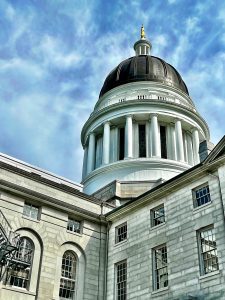Unprecedented Tax Hikes Loom Over Maine Cities and Towns as Expenses Continue to Surge

Maine municipalities grapple with unprecedented tax hikes as expenses continue to soar. While Westbrook’s city budget was being developed, it was evident that all costs would rise.
City officials proposed a “status quo” budget, excluding new positions or programs and reducing investments in streets, sidewalks, and public safety purchases. They also suggested transferring $1 million from the undesignated fund balance to counteract unavoidable expenses.
However, with a $3.2 million increase in school spending, residents could face an 8.8% tax hike, the largest in the city’s history.
Mayor Michael Foley acknowledges the difficulty of the situation, noting that skyrocketing prices for housing, food, fuel, energy, and other essentials are already putting pressure on residents.
Municipalities throughout southern Maine are in the midst of the annual budget process, attempting to balance the escalating costs of goods and services with the goal of minimizing tax impact. Large school budgets are further straining finances.
In many communities, staff had to create proposals without knowledge of school budgets.
In South Portland, the $45 million budget is down almost 15% from the current year, largely due to a $10 million reduction in General Assistance. However, when combined with the school budget, overall city spending could lead to a 4% increase in the tax rate.
Rising costs are affecting other municipalities as well, with North Yarmouth’s proposed $4.4 million budget potentially raising the tax rate by 3% or more.
In Portland, the proposed $261 million budget includes a 6.1% tax increase, which could have been much higher if staff had not worked to reduce it.
In addition to inflation, many municipalities face staffing challenges. To attract and retain employees in a competitive labor market, officials are prioritizing wage increases and other incentives.
For example, Westbrook’s budget does not include new positions but will invest over $1 million in pay and benefits. In Brunswick, the cost of salaries and benefits for existing employees rose by nearly $1.8 million, the largest portion of the town’s $4.1 million spending increase.
Municipalities are seeking ways to remain competitive and retain staff while trying to minimize the impact on taxpayers.
School budgets play a significant role in determining state tax rates, as they constitute a considerable portion of a state’s annual expenditure. Funding for education primarily comes from local property taxes, state revenue sources, and federal grants. As school budgets increase, the demand for additional funding sources grows, which may result in higher tax rates or adjustments to existing tax allocations.
Rising school budgets can be attributed to various factors such as increasing student enrollment, higher teacher salaries, improved infrastructure, and expanded educational programs. Additionally, the inflation rate influences the cost of goods and services required by schools, such as textbooks, technology, and transportation.
When school budgets increase, state governments may be compelled to raise tax rates to accommodate the growing expenses. This can lead to an increase in property taxes, income taxes, or sales taxes. Alternatively, states may opt to reallocate funds from other areas of the budget to cover education expenses, potentially impacting public services or infrastructure projects.
The impact of school budgets on state tax rates may vary depending on the state’s economic stability and revenue sources. In some cases, states with robust economies and diverse revenue streams may be able to absorb increased education costs without significantly affecting tax rates. However, in economically strained states, rising school budgets can lead to noticeable tax increases for residents.
Ultimately, the relationship between school budgets and state tax rates reflects the challenge that governments face in prioritizing and allocating resources to meet the needs of their constituents while maintaining fiscal responsibility.
Let’s find your way to tax and accounting peace of mind
Let us be part of your journey towards success.